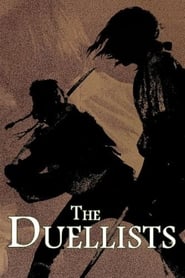Made for about one-tenth the budget of Kubrick’s project [Barry Lyndon, 1975], Scott’s picture embodies a kind of minimalism that takes natural wonders and makes them seem like elaborately constructed sets. […] Each man keeps going out of honor, which reaches almost absurd levels. Consider the duel where D’Hubert raises his hand to pause, turns to sneeze, and then returns to the duel. The kind of etiquette that allows for sneezing but no sense of understanding or forgiveness between soldiers becomes one of the film’s great ironies.[…]
Feraud’s ceaseless pride matches that of Napoleon’s lust for power, in that his frantic need to prove himself and his peasant class as the equal of, if not better than D’Hubert’s nobility, ultimately leads to overzealous self-destruction. Most poetic is how The Duellists does not require one of these characters to die by the hand of the other. In time, Napoleon is defeated, and his loyalists are branded criminals. Feraud would be executed if D’Hubert did not use his enduring influence to earn his opponent clemency; nevertheless, Feraud still demands satisfaction. During the final duel with pistols on D’Hubert’s estate, amid stunning ruins Scott found in the French countryside, D’Hubert has the opportunity to finally kill Feraud and instead declares their quarrel has ended. Much like Napoleon after Waterloo, Feraud is left alive either to dwindle like his former ruler or, as the sunlight emerging from behind the clouds suggests, accept his defeat and move on as France has done.
— Brian Eggert (Deep Focus Review)
At Strasbourg, they fight with sabers, at Augsburg with what looks almost like broadswords. Once they meet on horseback. Another time pistols are the weapons. Every time they meet, each pares a little more off the other. It's as if they were whittling each other down to the bone
— Vincent Canby (The New York Times)
When I made [The Duellists], they said, “Oh, we want to make this the British entry at Cannes.” I go, “Wow, OK.” Now I’m in Cannes and Roberto Rossellini was on the board [the jury]. I wonder if I’ll tell you this. You judge, be careful what I’m going to tell you. […] Rossellini said to me, “Listen, I love the movie. I want to give you the Palme d’Or.” He said, “The committee are rejecting it because somebody in there has bribed the committee to vote for somebody else.” […] He said, “What do you want to do?” I said, “[Expletive]. I never thought I’d come this far.” He said, “Good man.” And the Taviani brothers won for Padre Padrone” That was interesting. Money had been chucked in at the top.
— Ridley Scott (New York Times)
Synopsis: In 1800, as Napoleon Bonaparte rises to power in France, a rivalry erupts between Armand and Gabriel, two lieutenants in the French Army, over a perceived insult. For over a decade, they engage in a series of duels amidst larger conflicts, including the failed French invasion of Russia in 1812, and shifts in the political and social systems of Europe.

